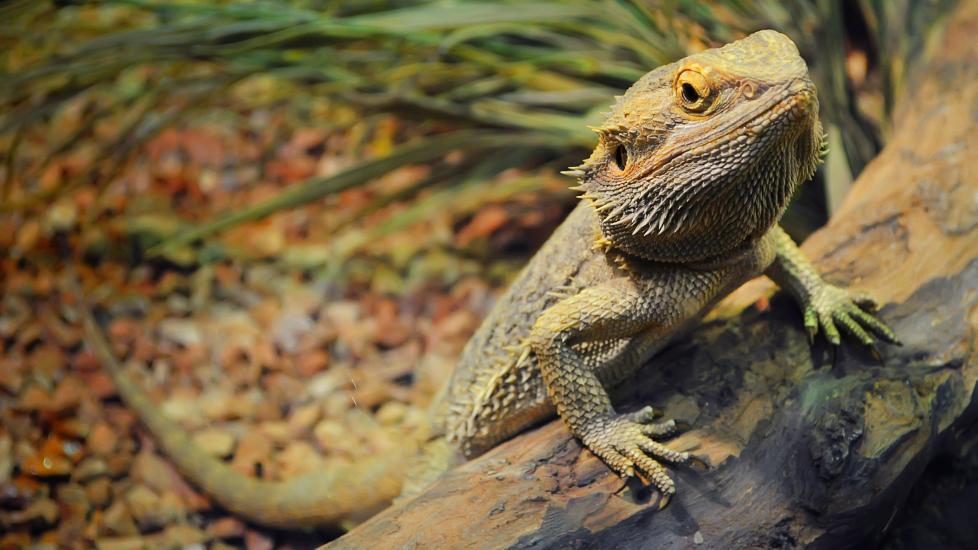Can Bearded Dragons Eat Grapes?
Feeding your bearded dragon properly is important to help prevent health problems and disease. A bearded dragon's dietary needs change throughout life and generally always include insects, vegetables, and fruits. Fruits in particular should make up 5–10% of a bearded dragon’s diet.
If you've ever had a dog, you may know that grapes and raisins can have toxic effects if ingested, but what about your bearded dragon? Can bearded dragons eat grapes?
Are Grapes Good for Bearded Dragons?
Grapes contain over 1,600 compounds, such as potassium, vitamin E, and antioxidants. These components can boost your bearded dragon's immune system and even promote eye health.
Grapes also have a high water content. Many bearded dragons drink water droplets from surfaces like plants and decor rather than drinking out of a bowl, so grapes can help promote hydration.
Not all grapes are created equally, however. Dark red and purple grapes will contain more antioxidants than white and green grapes, making them a more ideal snack for your lizard. While grapes have many health benefits, they shouldn’t be the main source of food for your bearded dragon’s diet due to their high sugar content, which can lead beardies to obesity.
Can Bearded Dragons Be Allergic to Grapes?
While it’s rare for a bearded dragon to be allergic to grapes, it can happen. A bearded dragon having an allergic reaction may begin gasping or flaring their nostrils. If your bearded dragon is exhibiting signs of difficulty breathing, seek veterinary care immediately.
Can Bearded Dragons Eat Grape Seeds?
When feeding grapes to your bearded dragon, always remove the seeds. Seeds can cause blockages within your bearded dragon's digestive tract, preventing waste from leaving their bodies which can be life-threatening. As a general rule, any fruit or vegetable containing seeds should always have them removed before it’s offered to your bearded dragon.
Can Bearded Dragons Eat Grape Jelly?
Fruit jelly contains a high amount of sugar and, often, high fructose corn syrup. Even a homemade jam will contain a higher amount of sugar than is recommended for your bearded dragon. It’s best to avoid jelly altogether.
You can puree grapes at home if you don't add other ingredients. Putting pureed fruit on a lick mat can be a fun form of enrichment for your bearded dragon!
Can Bearded Dragons Eat Wild Grapes?
It can be OK for your bearded dragon to eat wild grapes; however, they may not want to. Wild grapes are much different from those in the grocery store. Wild grapes tend to have thicker skin, which may make it harder for your bearded dragon to consume. Additionally, wild grapes are much more bitter than the domestic ones we are used to, so your bearded dragon may not enjoy their taste.
Wild grapes may contain chemicals and other harmful pesticides. If you do not know the source of the grape, it’s best to avoid offering it.
Can Bearded Dragons Eat Grape Leaves?
Bearded dragons may enjoy eating grape leaves. Grape leaves can be fed in moderation because they contain a high amount of vitamin A. Bearded dragons can be prone to vitamin A deficiency, which can make them sick. However, grape leaves, just like grapes themselves, should only make up 5–10% of their diet in combination with other varieties of fruits.
How Many Grapes Can a Bearded Dragon Eat?
Fruits are an essential part of a bearded dragon's diet, but they should be, at most, 5–10% of their total diet, or about one to two grapes once or twice a week as a treat. Having a gram scale to portion out your bearded dragon's food appropriately can be helpful.
While grapes have many health benefits, eating too many can cause digestion issues and lead to obesity. Obesity can be a problem in all reptiles, but bearded dragons are one of the most common species to struggle with it. Saving high-value treats higher in sugar, such as grapes, for physical enrichment can help motivate your bearded dragon and promote exercise.
How To Safely Feed Your Bearded Dragon Grapes
Wash the grapes thoroughly and remove any seeds. Depending on the size of your bearded dragon and the size of the grape, you may need to chop the fruit into pieces. Foods should be bite-sized to ensure your bearded dragon can safely consume them.
Foods that are too large for your bearded dragon can cause impactions. Impactions can create a blockage within the digestive system, causing little to no material to pass through the tract. Impactions can be fatal, so they are always considered a medical emergency. If your bearded dragon is not eating, defecating as normal, or is having trouble using their hind legs seek veterinary care immediately.
Fresh grapes have more nutritional value than cooking or freezing them. Grapes and other foods should be presented in a bowl, on a dish, or even in an enrichment item, especially if substrate is used in your bearded dragon's habitat. If the substrate is accidentally consumed, it may cause impaction as well.
What Other Fruits Can Bearded Dragons Eat?
Your bearded dragon may enjoy other fruits as well as grapes, such as:
-
Mangos
-
Apples
-
Apricots
-
Tomatoes
-
Blueberries
-
Strawberries
-
Raspberries
Avoid feeding your bearded dragon citrus fruits, as the acidity can cause gastrointestinal upset.
Featured Image: Shinedawn/iStock via Getty Images Plus
References
Divers S. Management and Husbandry of Reptiles - Exotic and Laboratory Animals. Merck Veterinary Manual. 2020.
Nijboer J. Nutrition in Reptiles - Management and Nutrition. Merck Veterinary Manual. 2020.
Gardiner J. Bearded Dragon Care. Animal Health Topics / School of Veterinary Medicine. 2019.
Klaphake E. American Association of Zoo Veterinarians Conference 2008. Published online 2015.
